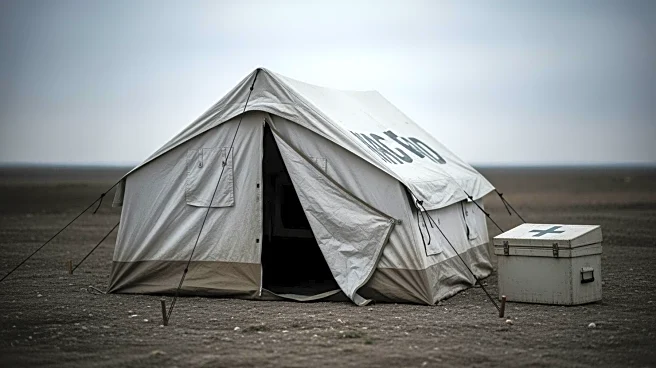What's Happening?
The Gaza Humanitarian Foundation has announced the cessation of its operations, citing the need to transition its efforts to the broader international community. This decision comes amidst ongoing challenges in providing humanitarian aid in Gaza, where
essential products like fresh meat and poultry remain scarce despite a ceasefire. Aid organizations, including Islamic Relief Worldwide, have struggled to procure adequate food and essential cooking materials due to high costs. The situation has been exacerbated by cold, wet weather, and the psychological toll on residents is significant, marked by deep uncertainty and exhaustion. Meanwhile, Israel continues to conduct strikes on Hezbollah targets in southern Lebanon, despite a ceasefire agreement signed last November. A recent Israeli airstrike in Beirut resulted in the death of Hezbollah chief of staff Haytham Ali Tabataba'i.
Why It's Important?
The end of operations by the Gaza Humanitarian Foundation highlights the ongoing humanitarian crisis in the region, which continues to strain resources and efforts to provide relief. The scarcity of essential goods and the psychological impact on residents underscore the urgent need for international intervention and support. The continued Israeli strikes in Lebanon, despite a ceasefire, further complicate the geopolitical landscape, potentially affecting regional stability. The humanitarian challenges in Gaza and the military actions in Lebanon could influence international diplomatic relations and humanitarian policies, as stakeholders may need to reassess their strategies to address these complex issues.
What's Next?
The cessation of the Gaza Humanitarian Foundation's operations may prompt other international organizations to increase their involvement in the region. There could be calls for renewed diplomatic efforts to ensure the ceasefire holds and to address the humanitarian needs of the affected populations. The international community may need to explore new avenues for providing aid and support to Gaza, while also monitoring the situation in Lebanon to prevent further escalation. Political leaders and humanitarian groups may engage in discussions to develop comprehensive strategies for long-term peace and stability in the region.
Beyond the Headlines
The ongoing conflict and humanitarian crises in Gaza and Lebanon raise ethical questions about the responsibilities of international actors in conflict zones. The challenges faced by aid organizations in procuring essential goods highlight the complexities of operating in areas with high costs and limited resources. The psychological impact on residents, marked by deep uncertainty and exhaustion, underscores the need for mental health support and resilience-building initiatives. The geopolitical tensions in the region may also influence global diplomatic relations, as countries navigate the balance between humanitarian aid and political interests.

















